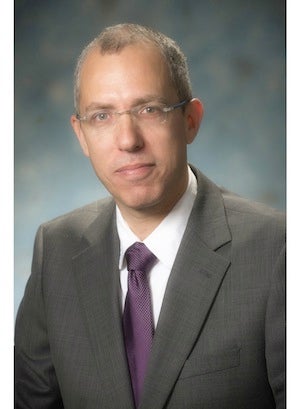Ido Warshavski, vice president, general counsel and corporate secretary of Lumenis discusses practicing law in Israel.

What does Lumenis do?
As its tagline suggests, Lumenis brings energy to healthcare. Lumenis develops and commercializes energy-based technologies, including laser, intense pulsed light (IPL) and radio-frequency (RF) for minimally-invasive clinical solutions in the aesthetic, surgical and ophthalmology markets. Lumenis has over 1,200 employees worldwide with its corporate headquarters in Israel, and regional offices in the United States, China, Japan, Germany, the United Kingdom, Italy, the Netherlands, Australia, India, Hong Kong, Singapore and Korea.
Why did you decide to join the Lumenis team?
I like the healthcare industry and Lumenis today is the largest, publicly traded medical device company in Israel. I was intrigued by the breadth of the business and growth potential of Lumenis. I also liked the opportunity to work for a leading company in its field and being part of a talented leadership team.
I joined Lumenis just a few months ago, after spending 10 years as the chief legal officer of Given Imaging Ltd, which was publicly traded in both the United States and Israel. I left Given Imaging in early 2014 when it was acquired by Covidien (now part of Medtronic) for approximately US$1 billion — one of the largest M&A deals in Israel that year. Given Imaging was a world-renowned company in the field of gastroenterology and pioneered the field known today as capsule endoscopy, a diagnostic procedure to detect abnormalities of the gastrointestinal tract using a wireless ingestible capsule.
At Lumenis, I find many of the same elements that made my years at Given Imaging so enjoyable and rewarding. Although Lumenis had experienced a few difficult years in the previous decade, it has been undergoing strategic transformation since the current CEO joined in mid- 2012. The company completed an IPO in the United States in February 2014, and has been experiencing both top and bottom-line growth for 10 consecutive quarters. Further, Lumenis is one of a few publicly-traded medical device companies in Israel. It has provided me with an opportunity to combine my knowledge in this industry with my experience and skills as chief legal counsel for a publicly traded company in the United States, while being part of a company with positive trajectory, global presence and concrete growth plans. I also like the challenge of leading the legal function of an organization with over 1,200 employees in several continents (with a particularly large presence in APAC), that operates in three business segments and encompasses a mix of cultures.
What is the biggest legal challenge you face right now?
The biggest challenge for the legal department is supporting a global business with so many different legal variables. We are subject to numerous applicable (and sometimes conflicting) laws in many jurisdictions that we have to consider in each situation. We are subject to US federal law by virtue of being publicly traded in the United States but also have to consider other federal, regional, country and local laws. We also are faced with issues in many legal fields for which we do not have in-house expertise, such as HR, litigation, antitrust, import/export laws, etc. It is a complex matrix that we have to deal with efficiently despite limited human and financial resources.
For me, personally, the biggest challenge is to lead the legal department to play a meaningful and favorable role at the board and senior management levels, and also exercise the correct judgment as to how legal considerations should mix with other considerations that are on the table of the business decision makers. I would like to develop trust with the company's leadership team so that my advice is sought and carries weight both routinely and in complex situations.
How does the legal department contribute to Lumenis' global growth?
The legal department is responsible for three main areas — legal, compliance and intellectual property. In our legal role, we work closely with the various departments and regions to support their needs in contracting, risk assessment, dispute-resolution management and corporate governance. In our compliance role, we advocate compliance with the many laws and regulations applicable to our business and with the company's internal policies and procedures. We also promote ethical business conduct. These roles facilitate activities leading to both top and bottom line growth and are also bringing balance by always assessing and addressing potential risks, thereby protecting the value and reputation of the company. In IP, the legal department manages the patent and trademark portfolio of the company, thereby helping to maintain a competitive advantage and market leadership. Our IP team also provides competitive intelligence and analysis helping the company identify potential areas for growth and mitigating freedom to operate risks.

As a medical device company, you obviously need to be on top of your intellectual property. How do you protect your IP portfolio?
As part of the legal department, we have an in-house global IP director whose primary responsibility is to manage our IP portfolio. We have a portfolio of approximately 260 registered patents and approximately 80 pending applications worldwide, covering many aspects of our technology and products. We work closely with the R&D team and business units in order to harvest ideas and innovation that we may want to patent. We use an internal, cross-functional IP committee to make decisions on patents. Protection of IP goes beyond patents. We also have registered and unregistered trademarks to protect our brands. We use contracts to ensure the company has rights to IP of employees, agents and service providers doing work for the company. And, obviously, we treat our expertise, know-how, and technologies that we do not patent as trade secrets, sharing them on a need-to-know basis only and subject to appropriate non-disclosure agreements. Occasionally, when circumstances warrant, we have to enforce our IP rights through litigation.
What are the legal department's strategic goal or goals for the next year?
The main goal of the legal function is to support the growth of the business, both the existing sales and marketing organization, and also through assessing and closing on business development opportunities. The primary goal of the compliance function is to strengthen our compliance program through writing and implementing policies in certain areas, conducting training and ensure our commercial and business engagements are done lawfully and ethically. The IP team builds IP protection around new developments and technologies and supports business development decisions. With these activities, we support the growth of the company, preserve its value and reputation and protect against risk.
How is practicing law in Israel culturally different from practicing law in the United States?
Having studied and practiced in both the United States and Israel, I think there are a few notable differences. In Israel, the ownership and control of many companies, including publicly traded companies, is concentrated so that many companies have controlling shareholder groups. In the United States, most public companies do not have controlling shareholders.This creates a different corporate governance environment in Israel than in the United States. The Israeli Companies Law includes many provisions intended to address the potential abuses to minority public shareholders that could result from the influence of controlling shareholders over a company. This makes corporate governance In Israel quite bureaucratic.
I also think there is a different perception of the role and status of in-house counsel. In the United States, the legal department and the chief legal counsel play an instrumental role in corporate business decisions, risk management and determining the core values of the corporation. There is also a rooted understanding that the in-house legal counsel should be independent with direct access to the CEO and the board. I believe that this is the correct approach to the role of the in-house legal team and the general counsel. In Israel, for the most part, legal departments are much smaller (many times consisting of only one or two lawyers) and the status of the in-house counsel is less developed. In-house counsel are often expected to play a rather technical role (e.g., of contract manager or a liaison between senior management and outside counsel), and often report to the CFO rather than the CEO. I wish boards and senior management of Israeli corporations would see the value that a good in-house counsel can bring to the table (and not just in cost saving) and embrace the US practice more willingly. Having said that, it is also up to in-house lawyers in Israel to push for this change and demonstrate the value they can bring to the business, as well as an understanding of the complexity of business leadership. ACC can play an important role in advancing this goal.




